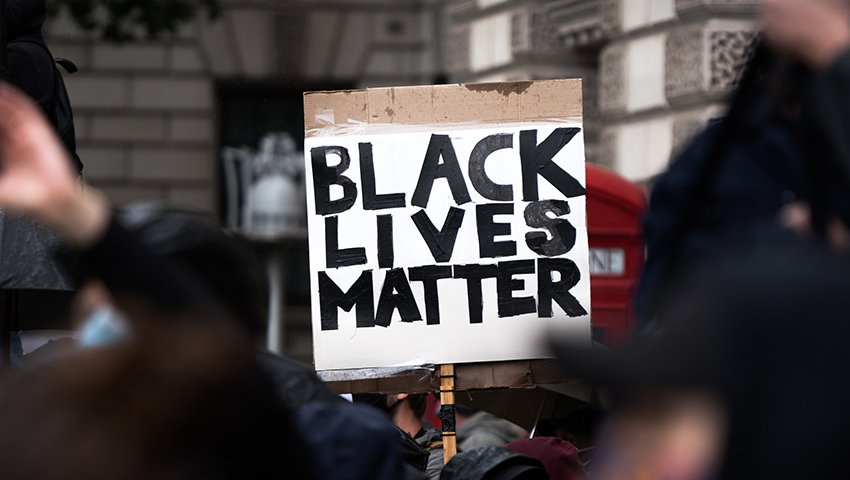Legal Spotlight

Diversity in the legal profession is crucial and more important than ever in the wake of the murder of George Floyd and the Black Lives Matter movement.
The killing of black American man George Floyd by a white police officer in May sparked an international outcry, which has generated protests demanding for more efforts to be made in the name of racial equality.
These protests have evolved to encompass more than police brutality in the US, snowballing into a cultural movement that has seen society reexamine the ways in which it approaches issues of race and diversity. Although the events that sparked the Black Lives Matter movement happened in another country, the issues it raises are just as relevant in the UK, where institutional racism remains a presence - as has been shown through the recent Windrush scandal.
The importance of diversity in the legal profession is crucial, but according to statistics compiled by the Solicitors Regulation Authority (SRA) in 2019, 21% of those working in the legal profession overall identify as belonging to a BAME group, with black lawyers making up 3% of the total number.
Although these figures will appear encouraging, there is a significant drop when focusing solely on the largest firms - specifically, those with more than 50 partners - for whom the proportion of BAME lawyers drops to just 8%. For this same group of firms, the fraction of black lawyers drops to just 1%. As a result, it would seem that the prestigious commercial law firms in the UK need to make an active effort to increase the diversity of their workforce.
This means removing any unconscious biases among employees and ensuring that at the recruitment stage places are offered by taking a range of factors into account. It’s not enough to simply look at applicants’ grades, the context of those grades relating to the societal background is also paramount when making recruitment choices.
In an increasingly multiethnic society such as the UK’s, it’s important for the workforce of law firms to be representative of the environment they operate in. This means including stakeholders from as many communities as possible so that as many perspectives and interests are taken into account in the running of the firm.
What’s more, commercial law firms are invariably agents of social change whose reach extends beyond their mere practice areas, and they are just as concerned with the rapidly evolving social changes as any other sector. The effect that firms can have on social mobility by democratising the legal profession would have a profound impact on BAME communities and accessibility in City-based professions.
Ultimately, commercial law firms are taking steps to ensure that their workplaces are more diverse and are environments in which those who identify as BAME can freely be themselves without needed to adapt or face discrimination, or be met with obstacles in their career progression as a result of racism. Nevertheless, the road remains long and the social movements of recent months have laid bare the importance of diversity and the responsibility that firms are faced with in this regard.
Cherie Samuels, Co-Chair of the CMS BAME Network said “CMS is extremely committed to promoting a truly diverse and inclusive work environment. Diversity in the legal field is as important now as it has ever been but it is refreshing and encouraging to see that firms are now putting more attention and resources into advancing ethnic diversity in law and working towards creating truly inclusive work environments for their BAME staff.
At CMS, following the tragic events this year, including the murder of George Floyd, Breonna Taylor and Ahmaud Arbery, we have been focussed on providing safe spaces for employees, in particular our black employees, to speak openly and honestly about their experiences by holding a series of firmwide discussion forums, which provide an opportunity to discuss everything from what BLM stands for to how microaggressions present themselves in the workplace. We have also held events with mental health specialists for our BAME colleagues as well as rolling out a reverse mentoring pilot with approximately 50% of our board members, who were paired with BAME associates from across the firm, and running presentations on “How to Talk About Race” to practice groups across the firm. These are just some examples of initiatives that we are employing to make the culture here at CMS even more inclusive for Black, Asian and minority ethnic employees and to create a healthier dialogue about race in the workplace.
We recognise that, like most firms, we have some way to go but we are focussing internally on firmwide education initiatives and fostering BAME talent and will continue to push for true equality, diversity and inclusion in the legal field.”
What is clear from Black Lives Matter is that change needs to be unyielding and enacted as soon as possible in order to provide tangible results beyond PR gestures, especially if firms are to keep up with and be an active part of a rapidly progressing society.
Academy tools to help you get a job
-

Free Watson Glaser Practice Test
Understand the test format, compare your performance with others, and boost your critical thinking skills.
